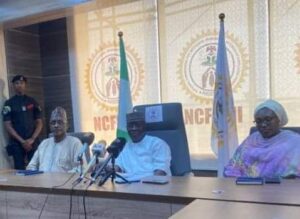
The Federal Commissioner of the National Commission for Refugees, Migrants, and Internally Displaced Persons, Tijani Aliyu Ahmed, has expressed “deep dismay” over the recent attack on the study centre of the National Open University of Nigeria (NOUN) in Nsu Ehime Mbano Local Government Area of Imo State.
Speaking at a press conference in Abuja, the commissioner strongly condemned the violent actions that resulted in the burning of the university premises and several homes in the area.
The Head of Press and Public Relation Unit of the commission, Zahra Ahmed Rufai, explained in a press release that the commissioner had visited the NOUN study centre in Nsu Ehime Mbano to assess its potential as a skills acquisition centre for training Persons of Concern (POCs) and youths from the five Southeastern states.
She said the centre was intended to support returnee migrants, refugees, displaced persons, and victims of floods or communal clashes.
“Unfortunately, misinformation spread by certain unscrupulous individuals regarding the purpose of the visit and the facility’s intended use sparked tension in the community. This tension ultimately culminated in the attack on the university premises.”
Ahmed emphasised that the media played a significant role in misrepresenting the purpose of his visit after a press briefing in Imo.
He noted that the visit was solely intended to explore the possibility of utilising the centre for vocational training and rehabilitation, benefiting the most vulnerable in society, including displaced persons and at-risk youth.
The commissioner strongly condemned the attack, reiterating that such misinformation-driven violence jeopardizes efforts to provide essential support to vulnerable communities.
He urged the media and the public to rely on accurate, verified information and called for calm in the wake of the incident.
He said the commission remains committed to its mandate of supporting returnee migrants, refugees, and displaced persons, and will continue working towards establishing centers that offer hope and empowerment to affected individuals.
